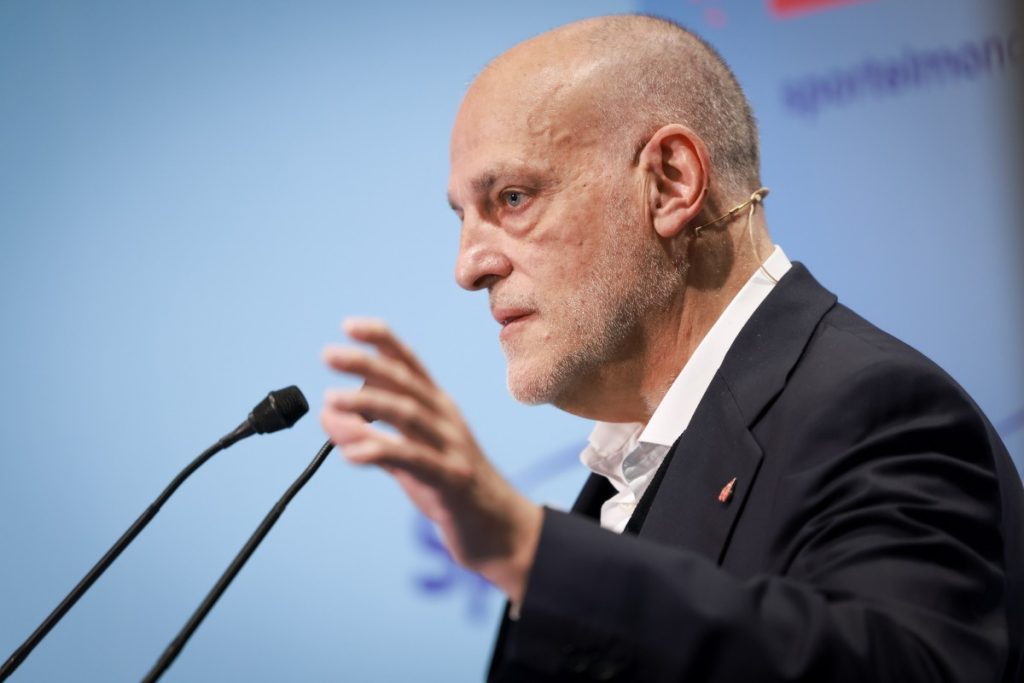A Familiar Foe for Manchester City Once Again Raises His Head
Manchester City’s involvement in legal cases has become a recurring theme in the world of football. From their legal victory over the Premier League regarding the Associated Party Transaction rules to the ongoing ‘115’ case, the club has faced its share of legal scrutiny. Now, a fresh legal challenge has emerged, this time from a familiar critic: La Liga president Javier Tebas. Known for his vocal stands against Manchester City, Tebas has once again stepped into the spotlight, confirming La Liga’s submission to the European Commission to investigate the club for financial irregularities. This submission is part of a broader strategy to ensure financial fairness in football, but it also highlights the ongoing tension between Tebas and the City Football Group, a tension that seems to resurface with predictable regularity.
Javier Tebas Takes Aim at Manchester City and the City Football Group
At the Financial Times Business in Football Summit in London, Javier Tebas addressed the issue head-on. According to Michael Pavitt of the Daily Mail, Tebas stated, "City were already expelled from European competition for two seasons but then they went to the Court of Arbitration for Sport – we call it a ‘court’ but it’s not really a court of justice." He emphasized that despite UEFA’s clear sanctions, the Court of Arbitration for Sport’s (CAS) ruling allowed Manchester City to continue their European campaigns. Tebas also pointed out the broader implications of the Premier League’s charges against City, noting, "I don’t know whether Manchester City will be deducted one point or 50 points or get relegated. All I know is the UEFA sanction was just, regardless of what CAS ruled."
Tebas Raises Concerns About Financial Irregularities
Tebas’s concerns extended beyond the immediate legal battles. He highlighted the issue of related parties needing to be kept at arm’s length, a principle applicable in various sectors, including football. Tebas provided a specific example of how City Football Group’s acquisition of Girona and the subsequent loaning of five players raised red flags. "We checked the valuations, we calculated they were 40 times higher than Manchester City claimed. We used our valuation, and that’s why there was no complaint or sanction," he explained. This discrepancy in valuations and the structure City Football Group uses to manage its finances are at the core of Tebas’s latest accusations.
Tebas’s Broader Financial Fairness Concerns
Tebas’s critique of Manchester City delved deeper into the club’s financial practices. He alleged, "What worries me about Manchester City is something else. They have a group of companies outside of City Football Group. They saddle all their expenses to these companies." Tebas elaborated on how these external companies, such as scouting and marketing firms, can accrue high expenses and then invoice Manchester City for significantly lower amounts. This, he argues, allows the club to circumvent financial rules and create a structure that may be misleading to regulators. Tebas’s submission to the EU is not just about Manchester City but also reflects a larger battle to prevent state-owned entities from gaining unchecked influence in football. "As for Newcastle, we haven’t done anything about them yet. We don’t have enough data," he noted, underscoring his focus on clubs with significant financial backing.
Khaldoon Al-Mubarak’s Response
While Javier Tebas’s comments are heavy with accusations, they also evoke a memory of a statement from Manchester City chairman Khaldoon Al-Mubarak. Speaking in 2019, Al-Mubarak addressed Tebas’s claims of market distortion, stating, "He talks about how we distorted the market? There is a hypocrisy in this statement that is ironic. Number one, let’s look at the Spanish league, the time of breaking records on player acquisitions, I mean, who started that? Let’s go back to the world records, [Luis] Figo, [Zinedine] Zidane. These huge jumps in these transfers, where did they happen? You know, the history, you have to look back at the history of La Liga, a league dominated by two clubs, and Mr Tebas should look back at the history of that league and how distortion has happened throughout the ages." Al-Mubarak’s words remain relevant in 2025, as they point to the historical context of financial practices in La Liga, where Real Madrid and Barcelona have often set records for player acquisitions, leading to market distortions of their own.
The Ongoing Battle for Financial Fairness
Tebas’s comments and actions have not gone unchallenged. If Manchester City is found not to have violated any EU laws, the club may consider what actions to take in response to these accusations. The question remains whether the heavy allegations Tebas makes will eventually backfire, especially if they are unfounded. For now, the best approach seems to be the one adopted by Manchester City’s manager, Pep Guardiola. Ahead of his team’s FA Cup tie against Plymouth Argyle, Guardiola refused to comment on Tebas’s latest remarks, choosing instead to focus on the present and the immediate challenges his team faces. This pragmatic stance reflects the club’s strategy to wait for a resolution before engaging in further discourse. As the case unfolds, football fans and stakeholders will closely watch to see how it impacts the landscape of financial fairness in the sport.











